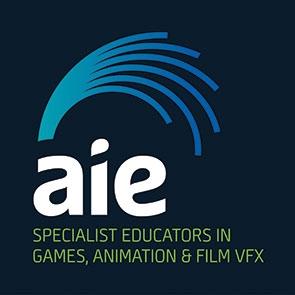The Challenge
The Academy of Interactive Entertainment (AIE) is Australia’s most recognised education provider in the fields of 3D animation, game development and visual effects. As a not-for-profit RTO founded to prepare students for careers, while also growing the digital arts industry and promoting new businesses, AIE delivers nationally-accredited courses to a worldwide audience from four campuses in Australia, two in the United States and their well-established Online Campus.
One of the first institutions to offer online courses in game development, AIE launched their e-learning program in 2005 with a self-hosted version of Moodle. But, as Web 2.0 technologies evolved over the next decade, users came to expect a more intuitive online experience—and AIE students were no exception. The new generation of digital natives found Moodle di cult to use and school administrators found it dated. “The system wasn’t built to do what we wanted it to do, fundamentally,” said Director of Marketing and Business Development for AIE, Neil Boyd.
In 2016, AIE began their search for an LMS that would simplify learning technology for students and teachers, and provide a reliable cloud infrastructure to eliminate the headache of self-hosting for administrators. According to Boyd, “We were looking to replace our old system with something a lot more intuitive—something that you didn’t have to teach people how to use. We really wanted to adopt a system that wasn’t driven by IT, but was driven by education.”
Key Findings
With Canvas, AIE unified their physical and online campuses, while streamlining and simplifying everyday tasks for students and teachers.
Canvas enables AIE to address specific aspects of student competency and performance criteria for RTO assessments.
The Canvas Discussions feature gives students a place to share ideas and build a community of creativity that helps prepare them for the real world.
TECHNOLOGY IS ALL ABOUT MAKING YOUR LIFE EASIER, AND THAT’S WHAT CANVAS DOES.
NEIL BOYD
Director of Marketing and Business Development, AIE
The Decision
With a curriculum that emphasises hands-on learning and collaboration among students, AIE began their search for a new LMS by evaluating the technologies that students and teachers found most usable. They quickly zeroed in on Canvas.
After running a Canvas trial, administrators observed that teachers could learn Canvas faster than competing learning management systems, and those who did became “champions” of the technology. This ease of use, combined with Canvas’ native cloud infrastructure, mobile apps and access via tablets—which would all serve to keep distance students connected and engaged—led AIE to choose Canvas and move immediately towards implementation.
Within weeks, AIE started reimagining their Online Campus. Administrators created new courses, certificates, qualifications and templates, and the Canvas team o ered technical advice to help the academy achieve their objectives. According to the Online Head of School and Programming Curriculum Coordinator, Lea Michael, “Switching to Canvas … was like a breath of fresh air because the features were already built—a lot of the ones an online campus specifically needs—so things like assessments, work a lot more e ectively for an RTO.”
The Results
With Canvas, AIE teachers are now better able to assess student competency and performance criteria because they can make progressive assessments, checking off requirements individually rather than all at once. “We have to reach a lot of compliance as an organisation and data is really important,” said Head of Game Art, Dean Finnigan. “Canvas has allowed us to get access to that data and really work with it.”
Beyond streamlining assessments, Canvas has enabled AIE to unify their physical and online campuses, while simplifying everyday tasks for students and teachers. In the days before Canvas, students used a separate plugin and server to upload large assessment files, then took additional steps to get feedback from teachers. Now, they simply upload their files seamlessly through Canvas where teachers can provide immediate feedback via text, audio or video without cumbersome downloads.
Additionally, administrators say the Canvas Discussions feature has given students a place to share ideas and build a community of creativity that helps prepare them for the real world. “I feel like Canvas empowers students to be workforce ready, mainly because it allows them to collaborate with a lot of other people easily in a digital forum,” said Stephanie Cholakyan, an AIE Game Art teacher.
Although AIE is just getting started with Canvas, they believe they now have the technology and the vision to meet the demands of their ever-changing industry. Offering advice for other institutions following in the footsteps of AIE, Finnegan said, “Don't just export what you had in your old learning management system into Canvas. Look at what Canvas is offering as a holistic approach to all your learning needs.”
Download Case Study
